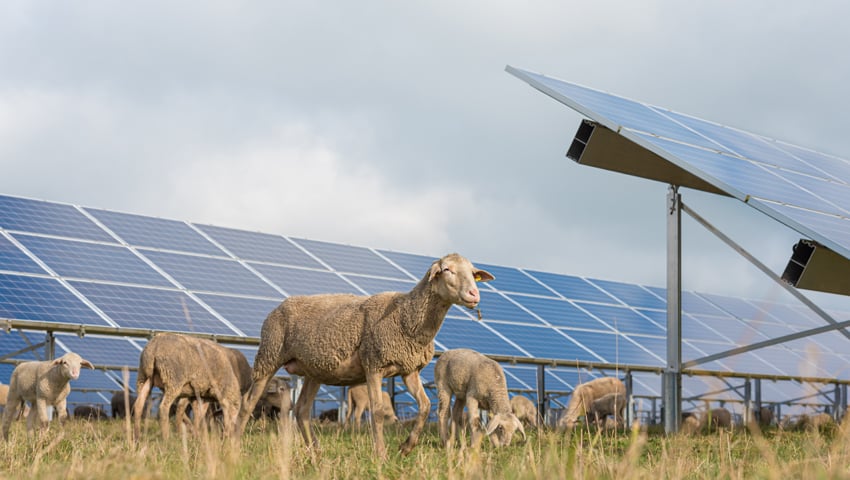Geopolitical crises such as the war in Ukraine, inflation and extreme weather have created a ‘perfect storm’ that has pushed British farms to the brink. But solar farms are helping them to keep producing food, a new report demonstrates.
In response to a survey of farmers, landowners and tenant farmers launched by trade association Solar Energy UK last year:
- 31 per cent of respondents said production was below-average or very low last year, due to adverse weather conditions
- 44 per cent had below-average or very low incomes
- 37 per cent said that additional revenue from solar energy would help secure their farm for future generations
- 60 per cent did not currently have renewable energy – indicating a significant opportunity for growth. However, being unable to connect to the electricity grid and planning constraints were commonly cited as impediments
The Farming Sustainably Report, built on 271 responses from across the UK, shows that an increasing number are diversifying their land use to stabilise incomes and increase resilience in the face of uncertain harvests.
One farmer said, “Back in 2014, we were really struggling financially and the additional income from the solar was an absolute lifesaver. We went from being £400k overdrawn to receiving a £336k uplift. This pretty much saved the future of the farm and allowed me to diversify into letting, property development and a new livestock enterprise housing cattle over the winter.”
The report explores the challenges facing British farmers and the extent to which they have been able to adapt. The survey, on which the report is based, also asked farmers what potential they see in renewables to deliver economic and environmental sustainability on their farms, and whether concerns surrounding farm diversification posing a threat to food security are have any basis.
As one 500-acre farmer said, “I am confident in the future now that I have the added income of the solar farm. I’m a third-generation farmer and my son has now joined the company, I feel the future is bright. We have 100 acres of solar already. Without it, I wouldn’t be confident.”
The impacts of climate change are becoming more evident to farmers. Seven in ten respondents concluded that it had an impact on their farms: waterlogged land “drowning crops” and making reseeding “virtually impossible”, noted two respondents. “My grandfather recorded an average of 700mm of rain per year in the 1970s and 80s. We now are averaging 1200mm with the last 2 years being nearer 1500mm,” said another.
In a foreword to Farming Sustainably, Solar Energy UK Chief Executive Chris Hewett said, “We believe farmers’ perspectives have been largely missing from the recent national debate on farm renewables.
“The report finds that, for many who have been able to diversify, solar is helping to keep their farms viable. They have more reliable revenue streams keeping their farms profitable whilst securing domestic food supplies. Suffice to say, energy security and food security are not conflicting missions. To echo the energy secretary, Ed Miliband’s recent pledge, we must ‘proceed not on the basis of myth and false information, but on evidence,’ when it comes to solar.”
We hope that the report can be harnessed by farmers, communities and the renewable energy sector when engaging with planning officials, MPs and local councillors, helping to dispel persistent myths about solar farms.
Sadly, the report confirms that some misconceptions still remain among farmers who don’t have renewables on their land, notably on food security, economics and climate change.
Delivering governmental goals for solar over the next decade would take up a fraction of a percent of the UK’s land – far too little to make a significant impact on food production – and grazing commonly continues. There is also a wealth of independent evidence, including from the RSPB, that solar farms offer enormous benefits for the natural world, with an abundance of wildflowers, pollinators, wild bird and mammals.
As the report says, the cost of solar panels has fallen by 90 per cent over the past decade, with solar producing some of the cheapest energy ever known. By providing a direct and long-term revenue stream for farmers who choose to host a project on their land. By helping to keep UK farming profitable, solar is also helping to secure the UK’s domestic food supply.
Defra says that climate change could reduce the UK’s stock of high-grade agricultural land by nearly three-quarters by 2050. Because solar farms generate renewable electricity, they help address climate change as well as supporting farmers’ incomes.
The report concludes with advice to farmers to consider solar energy to secure long-term financial stability, explore government support and incentives, collaborate with the solar sector and neighbours to develop larger installations with lower cost per watt and seek out available resources to build confidence in renewable energy, including from Solar Energy UK.
